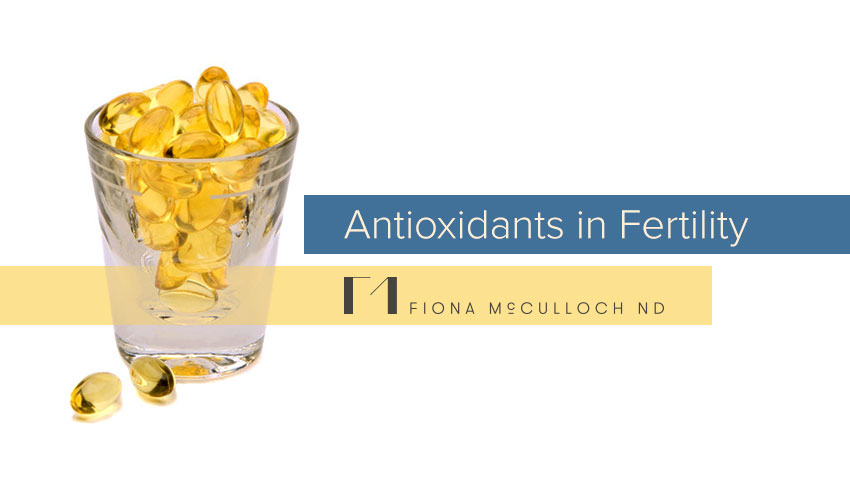A new study was just released today on antioxidants and female fertility from Fertility and Sterility from Boston IVF/Harvard Vanguard Medical Associates. The study investigated the use of antioxidant supplements in couples suffering from unexplained infertility. Infertility is an important health issue that affects 20% of all couples.
Antioxidants scavenge the damaging free radicals that have been implicated in damage to the eggs and the quality of the endometrial lining, both of which are crucial for healthy fertility. Lower total antioxidant status (TAS) has been found in the blood of women with polycystic ovarian syndrome which is associated with infertility, and the abdominal fluid of women with unexplained infertility compared with fertile control women. Advanced maternal age and obesity which are also associated with infertility, are also linked to lower antioxidant status. As such it is quite logical to think that using antioxidants might improve the cellular health of patients who are suffering with infertility.
The study followed 487 couples, in which the woman was 21-39 years old. These couples sought care for unexplained infertility at Boston IVF or Harvard Vanguard Medical Associates from September 14, 2001, to August 31, 2005. To be eligible, the patients had to have undergone 12 months of unsuccessful attempted conception; at least one ovary and open fallopian tube confirmed by HSG or laparoscopy, no pelvic diseases such as endometriosis, history of ectopic pregnancy, or prior infertility treatments (except for up to 3 cycles of Clomid without IUI). A good ovarian reserve, demonstrated by cycle day 3 FSH and E2 values were also required.
Supplements in the Study
Among the participants, 273 pregnancies resulting in a live birth occurred. 84% of study participants reported taking vitamin supplements regularly. An overwhelming number of the patients did not smoke.
- ß-Carotene
Higher intakes of ß-carotene from dietary supplements was associated with a shorter time to pregnancy in overweight/obese women whose Body Mass Index (BMI) was greater than 25, and also in the younger age group (under 35 years old). In the group of women over 35 years old, ß-Carotene was associated with a longer time to pregnancy. ß-Carotene has intense antioxidant activity, and lower concentration of ß-carotene in the fluid surround the egg is associated with decreased IVF success rates. Interestingly, diet-induced hypercarotenemia is associated with disrupting ovulation and amenorrhea, possibly owing to changes in progesterone levels. It should be emphasized that a delay in time to pregnancy with increased dietary ß-carotene did not occur in women with BMI
Take home message, avoid excessive beta carotene if you are over 35 and of normal weight. Eating carotenoid rich foods such as carrots, yams, kale and other leafy greens may benefit fertility in women under 35, and who are overweight.
- Vitamin C
Throughout the body, vitamin C slows down free radicals and helps in the recycling of glutathione and vitamin E. Animal models suggest a role for vitamin C as a key cofactor in the formation of the progesterone producing corpus luteum; which keeps the structure of the endometrial lining intact. Obesity and advanced maternal age are associated with oxidative stress and increased production of damaging oxidative species.
Vitamin C did in fact improve the time to conception in women with a BMI under 25. However it was noted that in this study, intake of vitamin C among the overweight participants, and most women in the >35 year old category may not have been high enough to enhance fertility given the increased amount of oxidative stress they are under.
Take home message – vitamin C is good for your fertility no matter which bracket you are in.
- Vitamin E
Increased intake of vitamin E from supplements and total dietary vitamin E through food sources, were associated to a shorter time to pregnancy in women =35 years of age. It is thought that the aging ovary requires more vitamin E to protect it during the process of the formation of the corpus luteum. Vitamin E also can help prevent damage to the surface of the ovary, which is more common in older women.
Bottom Line
Vitamin E is good for fertility in women over 35 years old.
Article References:
- Elizabeth H. Ruder, Terryl J. Hartman, Richard H. Reindollar, Marlene B. GoldmanFemale dietary antioxidant intake and time to pregnancy among couples treated for unexplained infertilityFertility and Sterility17 December 2013;10.1016/j.fertnstert.2013.11.008
